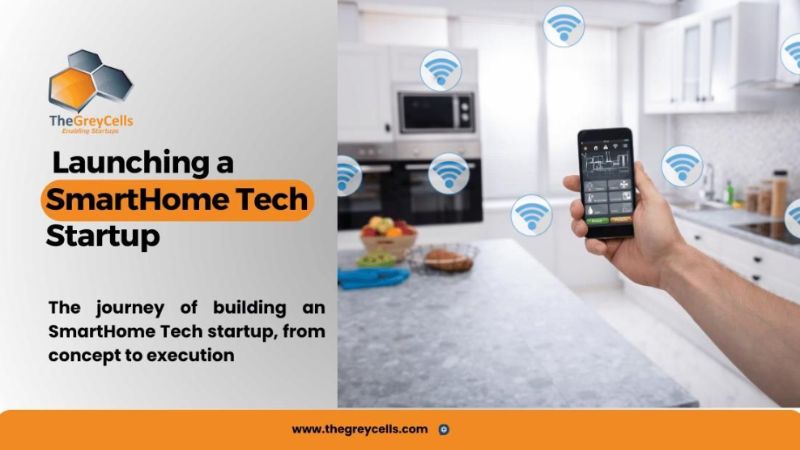Launching a Smart Home Technology Startup: A Comprehensive Guide
The smart home technology market is booming, driven by increasing consumer demand for convenience, security, and energy efficiency. For entrepreneurs, this presents a golden opportunity to create innovative products that make homes smarter and more connected. This guide will take you through the journey of launching a smart home technology startup, from ideation to execution, and offer insights on building a successful and impactful business.
Identifying Your Niche
The first step in launching a smart home technology startup is identifying your niche. The smart home market is diverse, and focusing on a specific area can help you stand out and attract a dedicated customer base. Here are some potential niches within smart home technology:
- Home Security: Develop smart cameras, doorbells, and alarm systems.
- Energy Management: Create smart thermostats, lighting, and energy-saving devices.
- Home Automation: Design centralized control systems for lighting, appliances, and entertainment.
- Health and Wellness: Produce smart air purifiers, sleep trackers, and fitness devices.
Connected Appliances: Innovate smart refrigerators, ovens, and washing machines.The first step in launching a smart home technology startup is identifying your niche. The smart home market is diverse, and focusing on a specific area can help you stand out and attract a dedicated customer base. Here are some potential niches within smart home technology:
- Home Security: Develop smart cameras, doorbells, and alarm systems.
- Energy Management: Create smart thermostats, lighting, and energy-saving devices.
- Home Automation: Design centralized control systems for lighting, appliances, and entertainment.
- Health and Wellness: Produce smart air purifiers, sleep trackers, and fitness devices.
Connected Appliances: Innovate smart refrigerators, ovens, and washing machines.
Market Research and Validation
To ensure your idea has a market, conduct thorough research:
- Surveys and Interviews: Directly gather insights from potential users about their smart home technology needs and preferences.
- Competitor Analysis: Study existing smart home technology products to identify gaps and opportunities.
- Industry Reports: Review studies on smart home trends and consumer behavior.
- Tech Forums: Engage with online communities and forums to understand the challenges and needs of tech enthusiasts and homeowners.
|
|
Thank you for Signing Up |


Creating a Business Plan
A solid business plan serves as a roadmap for your startup. Here’s what to include:
- Executive Summary: Provide an overview of your smart home technology startup, including your mission and vision.
- Market Analysis: Present findings from your market research, highlighting demand for smart home solutions and key competitors.
- Business Model: Outline your revenue streams, such as product sales, subscriptions, and licensing agreements.
- Product Line: Describe your smart home technology products, including their functionalities and target market.
- Marketing Strategy: Detail your approach to branding, social media marketing, influencer collaborations, and content marketing.
- Operations Plan: Explain how you will develop, test, and manufacture your products, including supply chain logistics.
Financial Plan: Provide financial projections, including startup costs, revenue forecasts, and funding requirements.
Developing Smart Home Products
Developing robust and user-friendly smart home products is crucial for your startup:
- Conceptualization: Brainstorm and refine your product ideas based on market research.
- Prototyping: Develop prototypes to test functionality and user experience.
- Testing and Validation: Rigorously test your products to ensure reliability and performance.
- Integration: Ensure your products can seamlessly integrate with existing smart home systems.
- User Feedback: Continuously collect and incorporate feedback from early adopters to improve your products.
Ethical Considerations and Compliance
Ensuring ethical practices and compliance with regulations is crucial in the smart home technology industry:
- Data Privacy: Implement robust data privacy measures to protect user information.
- Security Protocols: Use advanced security protocols to safeguard data and devices.
- Regulatory Adherence: Stay informed about technology regulations and ensure your products comply.
- Ethical AI: Develop AI solutions that are transparent, fair, and unbiased.
User Consent: Ensure users provide informed consent for the use of their data.
Building Your Team
Building a strong team is essential for the success of your smart home technology startup. Your team should include experts in technology, design, and business. Here are some key roles to consider:
- Hardware Engineers: Specialists in developing smart devices.
- Software Developers: Experts in creating the software that powers your smart home products.
- UX/UI Designers: Professionals who focus on creating a seamless user experience.
- Business Development: Experts in marketing, sales, and business strategy.
- Customer Support: A team to assist users and address their concerns.
Building Your Brand
Your brand identity is a critical component of your startup’s success:
- Brand Story: Craft a compelling story that communicates your mission and values in smart home technology.
- Visual Identity: Develop a cohesive visual identity, including your logo, color palette, and typography, that reflects your brand ethos.
- Website: Create a user-friendly website that showcases your products and brand story, providing a seamless shopping experience.
- Social Media: Engage with your audience on platforms like Instagram, Twitter, and Facebook, sharing content that highlights your smart home products.
- Content Marketing: Produce content that educates and inspires your audience about smart home living, such as blog posts, videos, and how-to guides.
Marketing and Sales Strategy
Attract and retain customers with a robust marketing and sales strategy:
- Social Media Marketing: Leverage platforms like Instagram, Twitter, and YouTube to showcase your products and connect with your audience through visually appealing content and storytelling.
- Influencer Partnerships: Collaborate with tech influencers who align with your brand values to reach a broader audience and build credibility.
- Email Marketing: Build an email list and send regular newsletters with updates, promotions, and educational content about smart home technology.
- Tech Expos: Participate in technology expos and trade shows to network, showcase your products, and stay updated on industry trends.
- E-commerce Platforms: Sell your products on your website and consider listing on smart home marketplaces to reach more customers.
Funding Your Startup
Securing funding is often one of the biggest challenges for startups. Consider these options:
- Bootstrapping: Use your own savings to start your business, maintaining full control and ownership.
- Crowdfunding: Launch a crowdfunding campaign on platforms like Kickstarter or Indiegogo to raise funds and build a community around your brand.
- Grants and Competitions: Apply for grants and enter business competitions focused on technology and innovation.
- Angel Investors: Seek out angel investors who are interested in supporting smart home technology startups.
- Venture Capital: Approach venture capital firms that invest in innovative tech solutions, offering growth capital in exchange for equity.
Launching Your Startup
After months of planning and preparation, it’s time to launch your smart home technology startup. Here are some tips for a successful launch:
- Launch Event: Host a virtual or in-person launch event to introduce your brand and showcase your smart home products.
- Press Releases: Send press releases to relevant media outlets to generate buzz and secure coverage.
- Social Media Campaign: Run a targeted social media campaign to build excitement and drive traffic to your website.
- Customer Feedback: Encourage early users to provide feedback and use it to make improvements to your products and user experience.
- Monitor Metrics: Track key performance indicators (KPIs) such as website traffic, user engagement, and sales to measure the success of your launch and make data-driven decisions.
Post-Launch Strategy
The work doesn’t stop after your launch. Continuously improving and scaling your business is key to long-term success. Here are some post-launch strategies:
- Customer Engagement: Keep engaging with your users through social media, email marketing, and community events to build loyalty and advocacy.
- Product Development: Regularly update your smart home products based on user feedback and technological advancements.
- Sustainability Initiatives: Continuously seek ways to improve your sustainability practices, such as reducing energy consumption and electronic waste.
- Partnerships: Collaborate with other tech companies and organizations to expand your reach and impact.
- Growth Strategy: Develop a long-term growth strategy that includes new sales channels, international expansion, and additional smart home solutions.

THE 7-STEP STARTUP SUCCESS FORMULA - DR. ANU KHANCHANDANI
Every entrepreneur’s journey is a mix of failures and successes. The probability of failure is higher, however, there is a way to grow and keep growing until you build a successful startup. This book is one such guide to help you with 7 formulas for your success.
Conclusion
Launching a smart home technology startup is a challenging but rewarding journey. By focusing on innovative solutions, ethical practices, and a strong brand identity, you can create a business that not only thrives financially but also makes a positive impact on how people live. Remember, every step you take towards innovation contributes to a smarter and more connected future.
With dedication, strategic planning, and the right guidance, you can turn your passion for smart home technology into a successful and impactful business.

With over two decades of experience in the software technology arena, having worked in multinational and SME companies in India, USA and Singapore in the capacity of programmer to CTO – I felt now was a good time to give back to the world what I have learnt in this journey. Even if it ends up benefitting a few of my readers by giving them insight or solving a technical issue, I think I will have achieved my mission!


